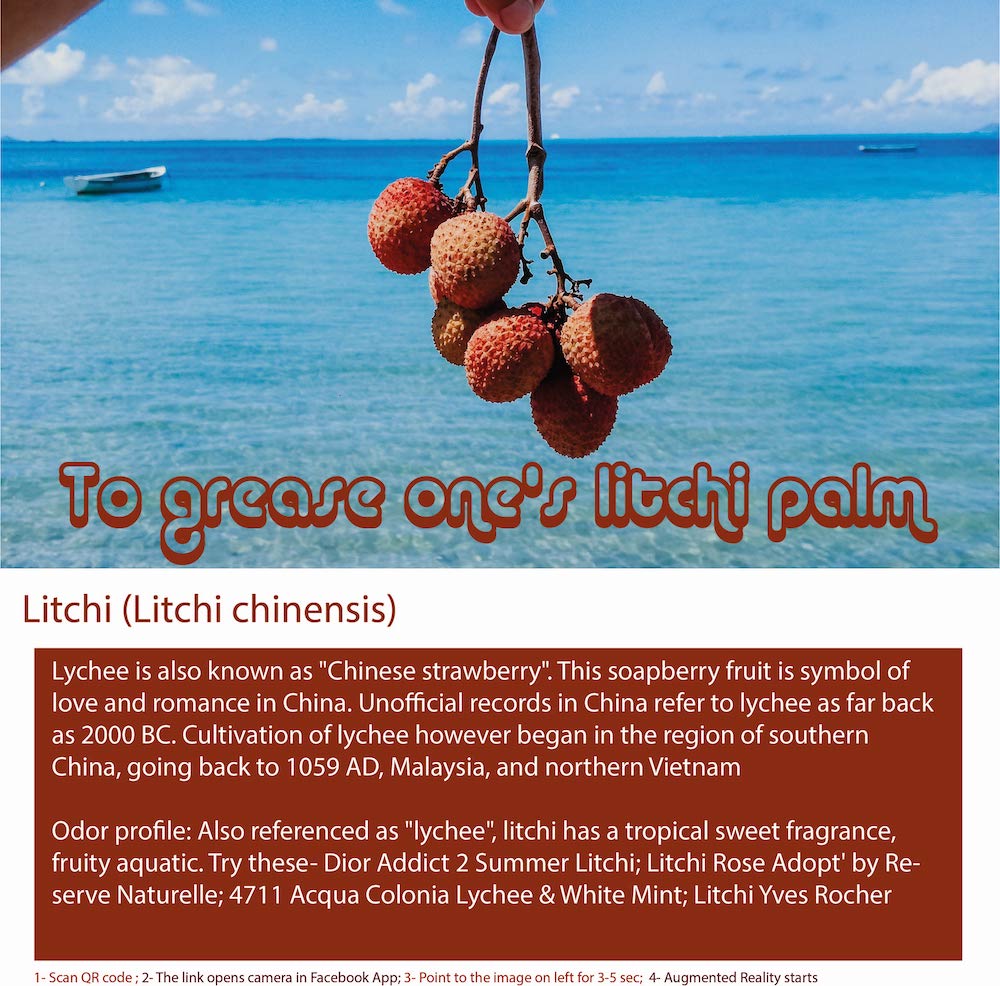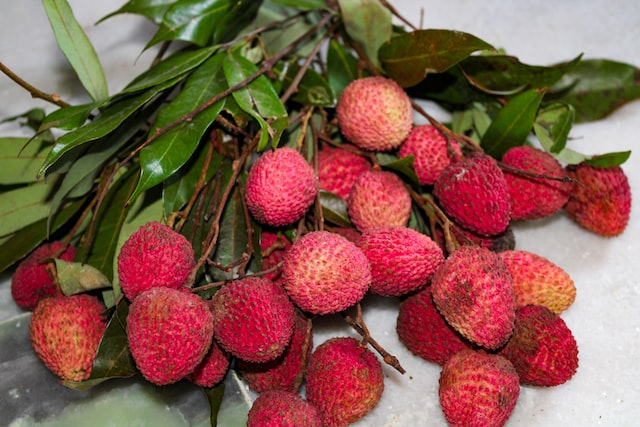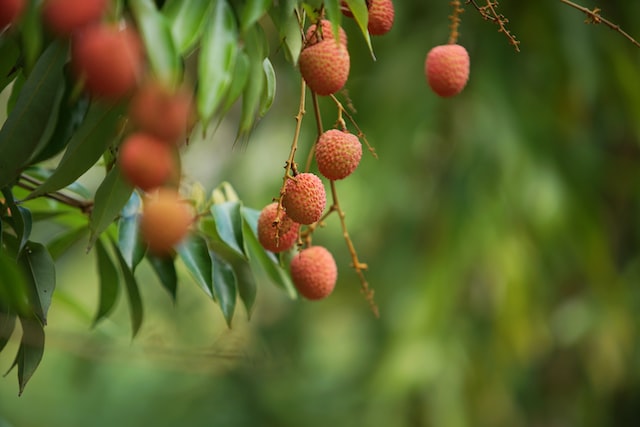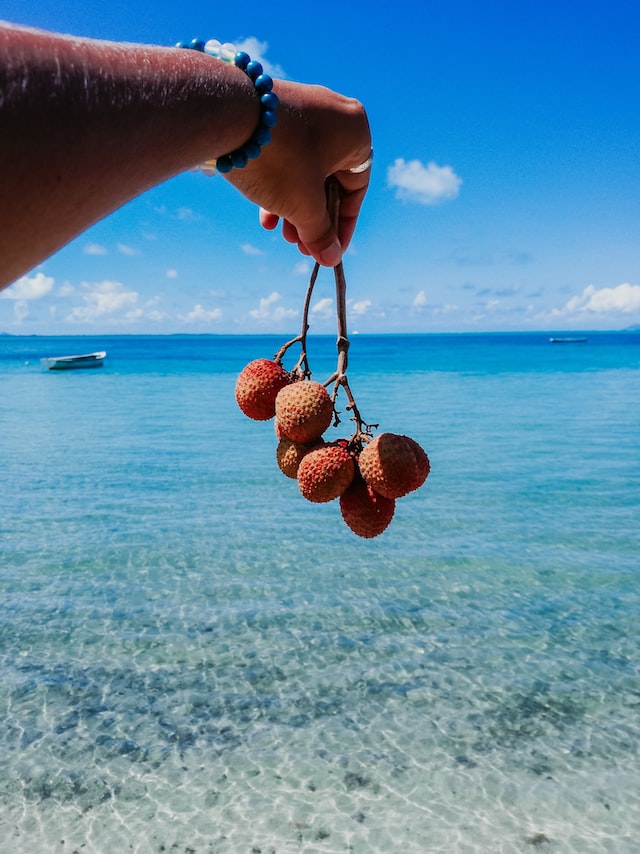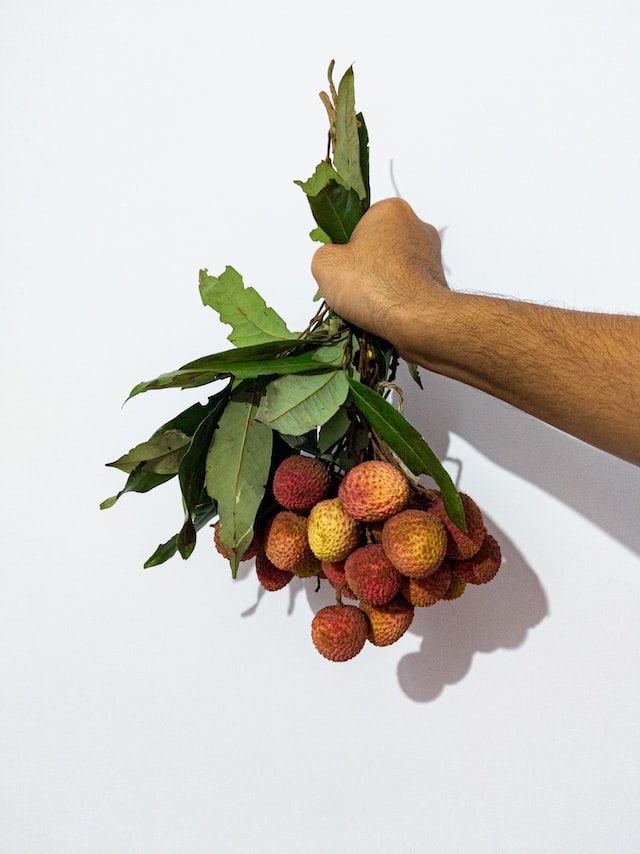The Delightful Aroma of Litchi in Perfumery
Litchi: The Exotic Jewel of Fragrance and Flavor
Introduction: Litchi, with its exotic appearance and unique flavor, is a delightful fruit that has enchanted cultures across Asia for centuries. Its sweet and floral aroma has inspired perfumers, while its therapeutic potential has intrigued practitioners of aromatherapy. Litchi's delectable taste and nutritional benefits have made it a prized ingredient in culinary creations. Moreover, litchi's medicinal applications and historical significance in Asian food culture add to its allure. This essay explores the captivating world of litchi, encompassing its presence in perfumes, therapeutic oils, food, medicine, and uncovering some fascinating and fun facts about this exotic jewel.
Historical Significance and Culinary Heritage: Litchi, scientifically known as Litchi chinensis, has a long history in Asian food culture. Originating in southern China, litchi was highly valued by Chinese emperors, and it became a symbol of luxury and prosperity. It was enjoyed as a royal delicacy in ancient times. Over the centuries, litchi spread to other parts of Asia, including India, Thailand, and Vietnam, where it became a popular fruit in traditional cuisine. Today, litchi is cherished globally for its unique taste and appeal.
Perfumes and Fragrance: The sweet and floral fragrance of litchi has captured the attention of perfumers, inspiring them to create delightful scents. Litchi's aroma is often associated with tropical and summery compositions. While litchi essential oil is not commonly available, perfumers may use synthetic compounds to recreate its alluring fragrance. Litchi's fruity and floral notes add a playful and joyful quality to perfumes, making it a popular choice in some niche and limited-edition fragrances.
Therapeutic Oils and Aromatherapy: Litchi essential oil is not widely used in aromatherapy, primarily due to its rarity and the complexity of extracting essential oil from the fruit. However, litchi's fragrance is believed to have therapeutic potential. Its sweet and uplifting aroma may help promote relaxation, reduce stress, and evoke feelings of happiness. The scent of litchi can create a refreshing and revitalizing atmosphere, making it a delightful addition to aromatherapy blends.
Culinary Delights: Litchi's unique taste and juicy texture make it a prized ingredient in various culinary creations. The fruit is commonly enjoyed fresh, either on its own or in fruit salads. Litchi is also used in desserts, such as litchi sorbets, litchi jelly, and litchi ice cream. In Asian cuisines, litchi is used to add a burst of flavor to savory dishes, such as curries, salads, and stir-fries. Additionally, litchi juice is a refreshing and popular beverage.
Medicinal Applications: In traditional medicine, litchi has been used for its potential health benefits. It is believed to be a good source of vitamins, minerals, and antioxidants. Litchi is considered beneficial for supporting the immune system, promoting healthy skin, and aiding digestion. As with any natural remedy, it is essential to consume litchi in moderation as part of a balanced diet.
Fun and Crazy Facts:
Litchi, with its exotic fragrance and delectable flavor, is a jewel of the citrus family that has delighted cultures across Asia and beyond. From its historical significance in ancient Chinese culture to its contemporary presence in global culinary delights and niche perfumes, litchi continues to captivate hearts and taste buds. Its therapeutic potential and nutritional benefits add to its allure as a cherished fruit. As we savor the enchanting taste and aroma of litchi, we are reminded of the diverse wonders of nature and the joy they bring to our lives.
Introduction: Litchi, with its exotic appearance and unique flavor, is a delightful fruit that has enchanted cultures across Asia for centuries. Its sweet and floral aroma has inspired perfumers, while its therapeutic potential has intrigued practitioners of aromatherapy. Litchi's delectable taste and nutritional benefits have made it a prized ingredient in culinary creations. Moreover, litchi's medicinal applications and historical significance in Asian food culture add to its allure. This essay explores the captivating world of litchi, encompassing its presence in perfumes, therapeutic oils, food, medicine, and uncovering some fascinating and fun facts about this exotic jewel.
Historical Significance and Culinary Heritage: Litchi, scientifically known as Litchi chinensis, has a long history in Asian food culture. Originating in southern China, litchi was highly valued by Chinese emperors, and it became a symbol of luxury and prosperity. It was enjoyed as a royal delicacy in ancient times. Over the centuries, litchi spread to other parts of Asia, including India, Thailand, and Vietnam, where it became a popular fruit in traditional cuisine. Today, litchi is cherished globally for its unique taste and appeal.
Perfumes and Fragrance: The sweet and floral fragrance of litchi has captured the attention of perfumers, inspiring them to create delightful scents. Litchi's aroma is often associated with tropical and summery compositions. While litchi essential oil is not commonly available, perfumers may use synthetic compounds to recreate its alluring fragrance. Litchi's fruity and floral notes add a playful and joyful quality to perfumes, making it a popular choice in some niche and limited-edition fragrances.
Therapeutic Oils and Aromatherapy: Litchi essential oil is not widely used in aromatherapy, primarily due to its rarity and the complexity of extracting essential oil from the fruit. However, litchi's fragrance is believed to have therapeutic potential. Its sweet and uplifting aroma may help promote relaxation, reduce stress, and evoke feelings of happiness. The scent of litchi can create a refreshing and revitalizing atmosphere, making it a delightful addition to aromatherapy blends.
Culinary Delights: Litchi's unique taste and juicy texture make it a prized ingredient in various culinary creations. The fruit is commonly enjoyed fresh, either on its own or in fruit salads. Litchi is also used in desserts, such as litchi sorbets, litchi jelly, and litchi ice cream. In Asian cuisines, litchi is used to add a burst of flavor to savory dishes, such as curries, salads, and stir-fries. Additionally, litchi juice is a refreshing and popular beverage.
Medicinal Applications: In traditional medicine, litchi has been used for its potential health benefits. It is believed to be a good source of vitamins, minerals, and antioxidants. Litchi is considered beneficial for supporting the immune system, promoting healthy skin, and aiding digestion. As with any natural remedy, it is essential to consume litchi in moderation as part of a balanced diet.
Fun and Crazy Facts:
- Chinese Mythology: In Chinese mythology, the litchi tree is associated with romance and love. The fruit was often gifted as a token of love and admiration.
- Litchi Festival: Litchi festivals are held in different parts of the world, celebrating the harvest of this exotic fruit with various cultural events and activities.
- Litchi Nut: Contrary to its name, the litchi fruit is not a nut but a fleshy drupe, belonging to the soapberry family.
- Perfume Collection: Some niche perfume brands have released limited-edition litchi-centered fragrances, showcasing the fruit's alluring aroma.
- Long Shelf Life: Fresh litchi fruit can be stored for up to two weeks if kept in a cool and dry place, making it an excellent fruit for shipping and export.
Litchi, with its exotic fragrance and delectable flavor, is a jewel of the citrus family that has delighted cultures across Asia and beyond. From its historical significance in ancient Chinese culture to its contemporary presence in global culinary delights and niche perfumes, litchi continues to captivate hearts and taste buds. Its therapeutic potential and nutritional benefits add to its allure as a cherished fruit. As we savor the enchanting taste and aroma of litchi, we are reminded of the diverse wonders of nature and the joy they bring to our lives.
To experience augmented reality, please open the Facebook-app using QR code and point to the image below
Crafting Exquisite Fragrances at Scentopia Singapore
The litchi, also known as the lychee or lichi, is a tropical fruit that is native to China. The litchi is a small, round fruit that is about the size of a cherry, with a red or pink, bumpy, inedible skin that surrounds a white, translucent, juicy flesh. The fruit has a single large seed in the center, which is also inedible. The litchi fruit is sweet and fragrant, with a unique taste that is often described as a combination of strawberry, grape, and pine nut flavors.
Litchi trees are small to medium-sized evergreen trees that can grow up to 40 feet tall. The trees are hardy and can tolerate a wide range of temperatures and soil types. They are typically propagated by air-layering or grafting and can bear fruit within 3-5 years.
Litchi is a popular fruit in Asia, where it has been cultivated for thousands of years. It's also grown in other tropical regions such as in Africa, South America, and Florida. The fruit is used in a variety of ways, including eaten fresh, canned, or dried, and is also used to make jams, jellies, and syrups. Litchi is also considered to be a good source of vitamin C and other antioxidants.
In summary, the litchi, also known as the lychee or lichi, is a tropical fruit that is native to China. It is a small, round fruit that is about the size of a cherry, with a red or pink, bumpy, inedible skin that surrounds a white, translucent, juicy flesh. The litchi fruit is sweet and fragrant, with a unique taste that is often described as a combination of strawberry, grape, and pine nut flavors. It's a popular fruit in Asia and also grown in other tropical regions such as in Africa, South America, and Florida.
Litchi trees are small to medium-sized evergreen trees that can grow up to 40 feet tall. The trees are hardy and can tolerate a wide range of temperatures and soil types. They are typically propagated by air-layering or grafting and can bear fruit within 3-5 years.
Litchi is a popular fruit in Asia, where it has been cultivated for thousands of years. It's also grown in other tropical regions such as in Africa, South America, and Florida. The fruit is used in a variety of ways, including eaten fresh, canned, or dried, and is also used to make jams, jellies, and syrups. Litchi is also considered to be a good source of vitamin C and other antioxidants.
In summary, the litchi, also known as the lychee or lichi, is a tropical fruit that is native to China. It is a small, round fruit that is about the size of a cherry, with a red or pink, bumpy, inedible skin that surrounds a white, translucent, juicy flesh. The litchi fruit is sweet and fragrant, with a unique taste that is often described as a combination of strawberry, grape, and pine nut flavors. It's a popular fruit in Asia and also grown in other tropical regions such as in Africa, South America, and Florida.
Unveiling the Allure of Fruity Perfume Ingredients
Here are some fun facts about litchi:
- The litchi is the official fruit of the city of Hakodate, Japan.
- The litchi fruit is believed to have been consumed by the Chinese elite as early as 2000 BC.
- The litchi tree is considered to be the most cold-sensitive of all commercial tropical fruits, and can only be grown in areas with a tropical or subtropical climate.
- The litchi fruit is rich in antioxidants and vitamin C, which can help to boost the immune system and protect against harmful free radicals.
- The litchi is sometimes used as a traditional medicine to treat a variety of ailments, such as high blood pressure and diabetes.
- Litchi is a popular ingredient in Chinese cuisine and is often used to make sweet and savory dishes, such as litchi chicken and litchi ice cream.
- In China, it's a tradition to give litchi as a gift to friends and family during the Dragon Boat Festival, which is celebrated on the fifth day of the fifth lunar month.
- The litchi fruit is highly perishable and should be eaten as soon as it is ripe, as it can quickly spoil.
- The litchi tree is considered to be an ornamental plant, as well as a fruit tree, due to its beautiful and fragrant flowers.
- Litchi is also called "lichee" in English, it's derived from the Chinese word "lizhi."
Litchi: A Distinctive Note in Perfume Making
The scent of litchi is described as sweet, fruity and floral. The aroma is delicate and subtle, with notes of rose and honey, and a hint of tropical fruit. Some people also describe the scent as having a slight muskiness to it. The fragrance is highly sought-after in perfumery for its unique and delicate aroma, and is often used in perfumes, candles, and other scented products.
Litchi oil is also extracted from the fruit, which is used in perfumes and other fragrance-based products. It is also used in aromatherapy for its refreshing, uplifting, and calming properties.
In summary, the scent of litchi is sweet, fruity and floral, with notes of rose and honey, and a hint of tropical fruit. The aroma is delicate and subtle, and it's highly sought-after in perfumery and aromatherapy. Litchi oil is also extracted from the fruit, which is used in perfumes and other fragrance-based products.
Litchi oil is also extracted from the fruit, which is used in perfumes and other fragrance-based products. It is also used in aromatherapy for its refreshing, uplifting, and calming properties.
In summary, the scent of litchi is sweet, fruity and floral, with notes of rose and honey, and a hint of tropical fruit. The aroma is delicate and subtle, and it's highly sought-after in perfumery and aromatherapy. Litchi oil is also extracted from the fruit, which is used in perfumes and other fragrance-based products.
The Art of Extracting Litchi Aroma for Perfumes
here are several perfume brands that have used litchi as a key ingredient in their fragrances. Some examples include:
- L'Artisan Parfumeur - This French perfume brand has a scent called "Litchi" which is a fruity and floral fragrance that features the aroma of litchi as the main note.
- Jo Malone - This British brand has a scent called "Lime Basil & Mandarin" which features litchi as one of the main notes.
- Yves Saint Laurent - The brand's "Black Opium" fragrance features litchi as one of the key notes, adding a sweet and fruity note to the overall scent.
- Giorgio Armani - The brand's "Si" fragrance features litchi as one of the key notes, adding a sweet and fruity note to the overall scent.
- Tom Ford - The brand's "Noir Pour Femme" fragrance features litchi as one of the key notes, adding a sweet and fruity note to the overall scent.
Join Scentopia, Sentosa's latest tourist attraction wonderful orchid scent crafting, fragrance tour, bridal shower or corporate team building which includes perfume making onsite and offsite, beach activities and more. We also serve primary school learning journey, secondary students and pupil on industrial excursions. Know more about our orchids perfume bar or therapeutic orchid scents and other wellness aromas. Conatct Perfume workshop or book a scent crafting session here.

